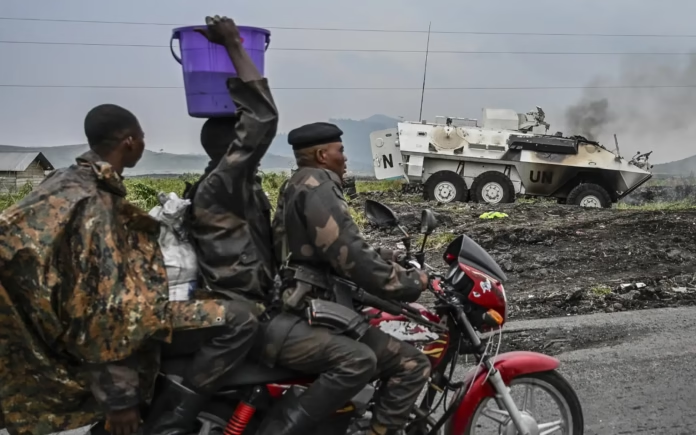Nearly 3,000 people have been killed and another 2,880 injured since January 26 in ongoing attacks by the M23 armed group and its allies, according to the United Nations High Commissioner for Human Rights. The violence, including the use of heavy weapons in populated areas, has intensified as M23 forces clash with the Democratic Republic of Congo’s (DRC) military and their allies in the North and South Kivu provinces.
The UN Human Rights Council convened in a special session on Thursday to address the growing crisis, where member states debated the establishment of a fact-finding mission to investigate human rights violations in the region. Hostilities have continued without pause in the mineral-rich area, long destabilized by armed groups, forcing hundreds of thousands of civilians to flee.
The M23, a majority-Tutsi rebel group, seized parts of North Kivu in late January, including areas near Goma, and has since advanced toward South Kivu and the city of Bukavu. As fighting escalates, the UN and aid organizations are struggling to provide humanitarian relief.
“The situation is catastrophic,” said Bintou Keita, the UN Special Representative of the Secretary-General in the DRC and chief of the peacekeeping mission (MONUSCO). She described the ongoing humanitarian crisis in Goma, which is under M23 control, where dead bodies still lie in the streets. She also reported that youth are being forcibly recruited into the conflict, while human rights defenders, civil society actors, and journalists are increasingly targeted.
The violence has also led to widespread sexual violence, with reports of rape, gang rape, and sexual slavery circulating from the region. Mr. Türk, the UN rights chief, condemned the rise in sexual violence, noting that two hospitals in Goma were bombed on January 27, killing and injuring several patients, including women and children. In the same area, a mass prison break occurred, with at least 165 female inmates reportedly raped and later killed in a suspicious fire.
In response to the escalating violence, DRC Minister of Communications and Media Patrick Muyaya Katembwe called out the continued military and financial support provided to armed groups by neighboring Rwanda. He accused Rwanda of exacerbating the conflict in the region by supporting M23 forces for over three decades, largely due to the exploitation of DRC’s vast natural resources.
Rwanda’s Ambassador to the UN in Geneva, James Ngango, denied the accusations, stating that the DRC-backed coalition was preparing for a large-scale attack on Rwanda. He alleged that weapons, including rockets and kamikaze drones, were being stockpiled near the border, posing a direct threat to Rwanda.
The Human Rights Council adopted a resolution to establish a fact-finding mission staffed by the UN Human Rights Office (OHCHR). The mission will begin work immediately, with a commission of inquiry set to take over once appointed.
Keita emphasized the urgency of humanitarian aid, particularly to Goma, where medical personnel are facing critical shortages, including power outages and a lack of fuel for essential services. She called on the international community to ensure that humanitarian assistance reaches those in need without delay.
The UN’s call for a fact-finding mission comes as the global community grapples with the long-standing conflict, which continues to inflict suffering on the people of eastern DRC. The region, rich in minerals used in products like mobile phones, remains at the heart of a geopolitical struggle, where the humanitarian toll continues to rise.



